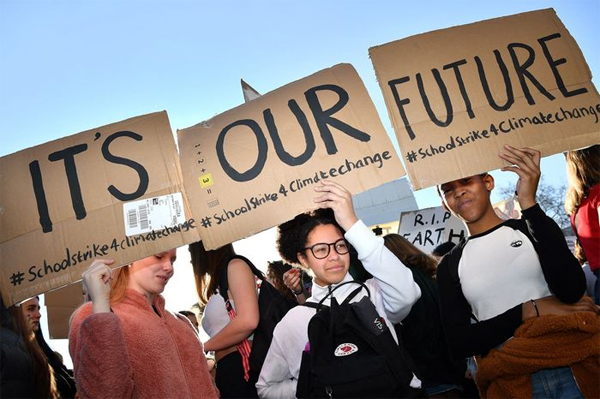
Rachel Koning Beals, MarketWatch
CHICAGO
EnergiesNet.com 10 26 2022
Without more aggressive action to slow the Earth-warming emissions that result from driving gas-powered cars and other dependence on fossil fuels, the planet will be in danger in just a few generations, the United Nations reports.
Only 26 of 193 countries that agreed last year to quicken climate actions have followed through with more ambitious plans to curb greenhouse gas emissions (GHG), according to the latest report from the U.N. Intergovernmental Panel on Climate Change (IPCC) out Wednesday.
That means without more aggressive reductions in GHG emissions, the planet is on track to warm by an average of 2.1 to 2.9 degrees Celsius, compared with preindustrial levels, by 2100.
Such an increase far exceeds the goal of 1.5 degrees C (2.7 degrees Fahrenheit) set by the landmark Paris agreement in 2015, and it crosses the threshold beyond which many scientists say the likelihood of catastrophic climate impacts — such as drought, hunger, eroding coastlines, increased respiratory issues and more — significantly increases.
“We’re bending the curve on emissions downwards, they are projected to go in the right direction,” U.N. climate change executive secretary Simon Stiell said at a press conference Wednesday.
“But they are not going down enough fast enough, far enough — this is nowhere near the scale of emissions reductions required to put us on track toward a 1.5C world,” he said.
Wednesday’s report hits just a few weeks before nations are set to gather at U.N. climate talks in Sharm el Sheikh, Egypt, for the Conference of Parties, or COP27.
And it arrives with the U.K. and Brazil in political turmoil, and with the Russian attack on Ukraine having disrupted global energy markets NG00, +1.32%.
In fact, Fatih Birol, executive director of the International Energy Agency, the Paris-based organization that represents the world’s largest oil-consuming CL00, 0.06% countries, said this week, “The world is in the middle of its first truly global energy crisis.”
Emissions from burning coal, oil and gas account for 70% of the GHG total, according to Energy Department data.
The energy crisis has some U.S. lawmakers urging for a return to more U.S. drilling, in order to cut dependence on Russia and other potentially geopolitical hotbeds. Advocates for alternative energy, such as wind and solar, and in some circles, nuclear, say this approach returns more energy and electric power sourcing closer to home, and thus, less exposed to global swings in supply.
Irreversible changes
The U.N. report out Wednesday analyzed the commitments made by countries to cut their emissions, known as nationally determined contributions, or NDCs. Countries that signed the 2015 Paris agreement promised to update and strengthen their commitments every five years. But in 2021, nations agreed not to wait another five years and instead pledged to make new commitments before the climate talks begin on Nov. 7 in Egypt.
While the consequences of heating above that 2-degree threshold are deemed to be catastrophic, the existing warming of 1.1C above pre-industrial times has already resulted in some irreversible changes, the report warned.
Climate scientists broadly estimate that human-caused greenhouse gas emissions need to be cut by 50% by the end of this decade, and to be eliminated by mid-century in order to keep warming below 2C by 2100. The U.S., under the Biden administration, has aimed for a 50% reduction by 2030, and net-zero emissions by 2050.
Net zero, by most measures, will be reached only by cutting fossil fuel use, switching to EVs — like those produced by Tesla TSLA, +1.00% and General Motors GM, +2.30% — for personal use and in cargo fleets, planting more carbon-absorbing trees and capturing and storing the carbon emissions that countries do emit.
For certain, private and public investment in “green” efforts will need to work in tandem.
A report from BNY Mellon Investment Management this week said that although green investment is growing, more action, ringing up at a lofty $100 trillion, will be required from governments, asset allocators and corporations to facilitate the transition to net zero.
This $100 trillion represents around 15% of total global investment over the next 30 years, or around 3% of global gross domestic product (GDP) over the same period, the group said in its release. Corporations in the S&P 500 SPX, -0.74% alone will need to spend roughly $12 trillion of “green” capital expenditure by 2050 to remain on course.
China-U.S. stalemate
The world’s top two polluters, China and the U.S., have taken some policy steps but have not pledged greater action this year, and climate negotiations between the two have been largely on hold.
China is one of the major holdouts on new emission-cutting commitments, although it surprised much of the world with a targeted net-zero plan issued ahead of the U.N. summit last year. China, at that time, set 2060 as its likely decade to flip to net-zero emissions. China has said its CO2 emissions will continue to grow until they peak by 2030, but it has not set targets for reducing other greenhouse gases, such as methane. Its emissions of methane, a more potent but shorter-lasting GHG, are enough to equal the total emissions of smaller nations.
Last year, China said it would stop building coal-burning power plants overseas. As of August, only about 26 out of 104 such projects had been terminated.
The Biden administration passed earlier this year a spending bill that featured the most attention on climate change to date, the Inflation Reduction Act, but was trimmed from a more ambitious early version. It did follow infrastructure legislation last year that also aimed to upgrade EV charging, energy efficiency and other efforts.
Earlier this week, the European Union said it would increase its emissions reduction pledges “as soon as possible,” but was limited to acting before member states agreed on a number of upcoming climate laws.
marketwatch.com 10 26 2022












